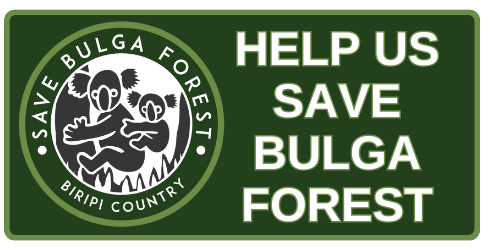Harvesting Machine starts destroying Bulga State Forest, 4th October, 2024
MEDIA RELEASE, 7 th October 2024
Five representatives of Save Bulga Forest (SBF); Matthew Bailey (Ecologist), Uncle John Clark OAM (Biripi Elder),
Susie Russell (North East Forest Alliance), Chris Sheed (Oxygen Farm Inc.), Councillor Dheera Smith (Mid Coast
Council), and Jane Watson (Save Bulga Forest) met with the NSW Forestry Corporation’s Dean Caton (Regional
Manager) and James Jaggers (Area Manager) at Club Taree last Thursday. SBF were demanding an end to native
forest logging in Compartments 41 and 43 of Bulga State Forest. Apologies were accepted from Matt Bell (Mid
Coast Council Senior Ecologist) who wrote in support of SBF’s demands.
SBF’s Chris Sheed said today, “SBF successfully halted logging in Bulga State Forest in December 2022. For the
last twenty months SBF has been regularly writing to the Forestry Corporation requesting a meeting to discuss
the logging of Bulga State Forest. All our requests were initially ignored and then became conditional on SBF
giving certain undertakings. On 26th September 2024, just four days before logging was to commence, and
when the logging machinery was already in the forest, SBF was finally invited to an unconditional meeting on
3rd October.
“SBF raised serious concerns at the meeting regarding the impacts of industrial logging on endangered
species, especially the Greater Glider – which has just won the Project’s Marsupial of the Year Award – and the
Koala. Both are dependent on this critical remnant forest that escaped the 2019 Black Summer bushfires. SBF
tabled an email from Matt Bell referencing the Mid Coast Koala Strategy and requesting that forestry activities
in Bulga State Forest – an Area of Regional Koala Significance (ARKS) – be suspended and deferred until such
time the koala population has demonstrably recovered from the impacts of the Black Summer bushfires, and it
can be proven that (harvesting) does not physically threaten or stress koala individuals. However, Forestry gave
a clear and concise ‘No’ to the request,” Mr Sheed said, adding, “Uncle John Clark requested information
surrounding the Aboriginal cultural heritage assessments and consultation which Forestry did agree to
provide.”
“Susie Russell explained to the meeting the many reasons why the Harvest Plans are believed to be incomplete
and non-compliant. These included misleading mapping of Greater Glider den tree exclusions; failure to lodge
roading plans, failure to determine dump locations, failure to map the den tree exclusions on the roading map;
failure to mark the dens in the field; failure to keep the published harvest plan up to date and only updating the
MapApp, which has no public access,” Mr Sheed continued.
“Matthew Bailey noted that the Greater Gliders at this time are likely to have young either leaving the pouch or
on mum’s back and this is likely to be a vulnerable part of their life cycle. SBF asked the FC to delay logging in
Bulga State Forest until the NSW Government has responded to the Independent Forestry Panel which is
currently receiving submissions regarding the future of native forest logging. SBF will be making a submission.
The Forestry Corporation also denied this request,” he said.
Mr Sheed explained, “We feel that the meeting was very disappointing. The Forestry Corporation rejected all our
concerns and categorically refused to halt the logging. SBF is especially concerned that recent court
judgements have noted that the Forestry Corporation has ‘proved it cannot be trusted and its cavalier attitude
to threatened species and their habitats must end.’ Just a matter of weeks ago the Forestry Corporation was
convicted of further criminal offences with the court finding that the Forestry Corporation ‘will continue to
undertake forestry harvesting activities and has not sufficiently demonstrated genuine contrition and remorse
for its commission of the offences’.
“Nevertheless, we will remain engaged with the Forestry Corporation, explore legal options, protest the logging
and continue trying to protect our remnant forests and their endangered wildlife,” Mr Sheed concluded.


In the ecological crisis that has caused global warming because of our dependence on fossil fuels for production and energy, every tree, every shrub, every blade of grass, counts. Species depend on whole systems for survival. Removing trees means removing means of survival for so many native flora, fauna, native anim asls